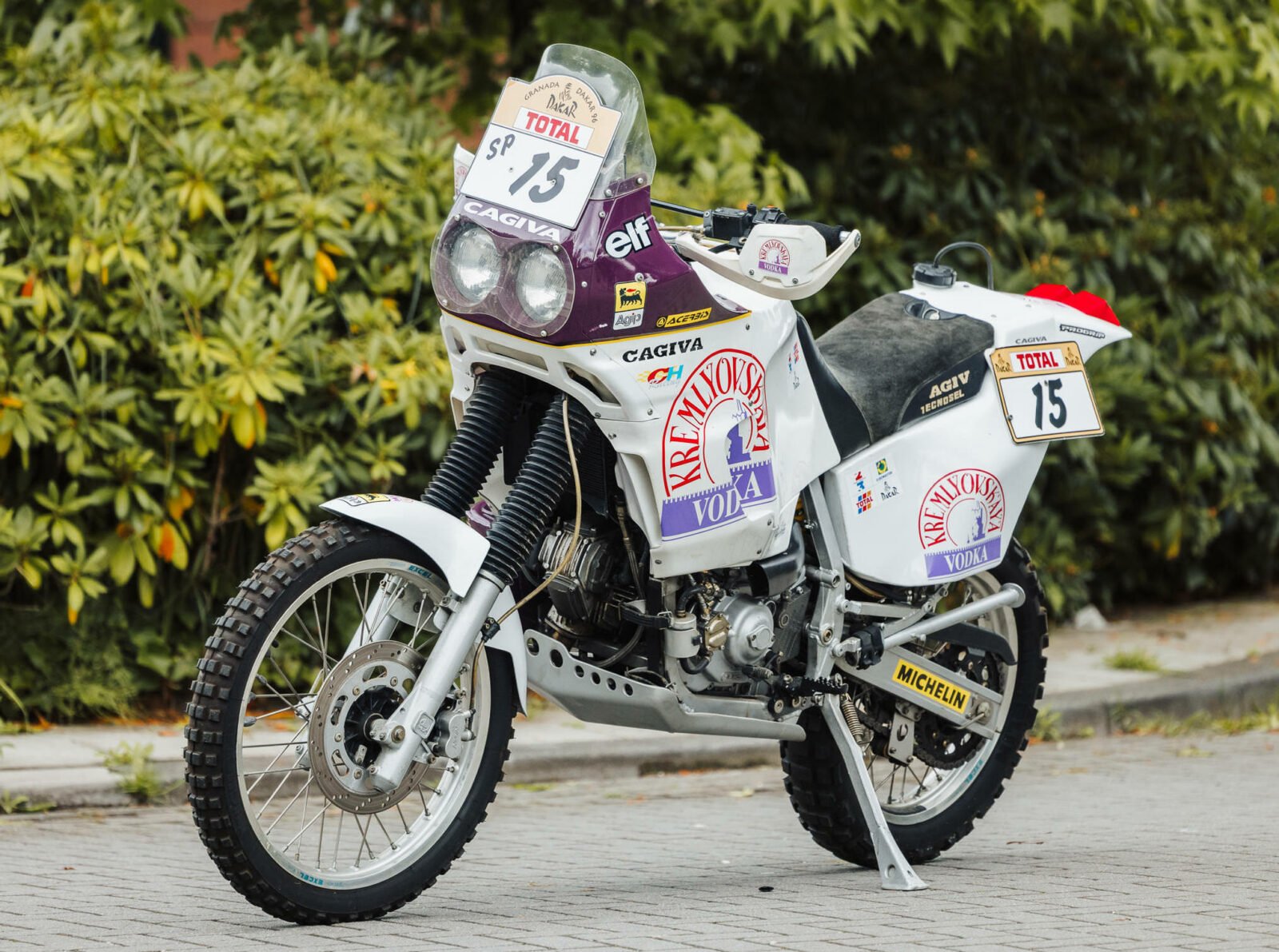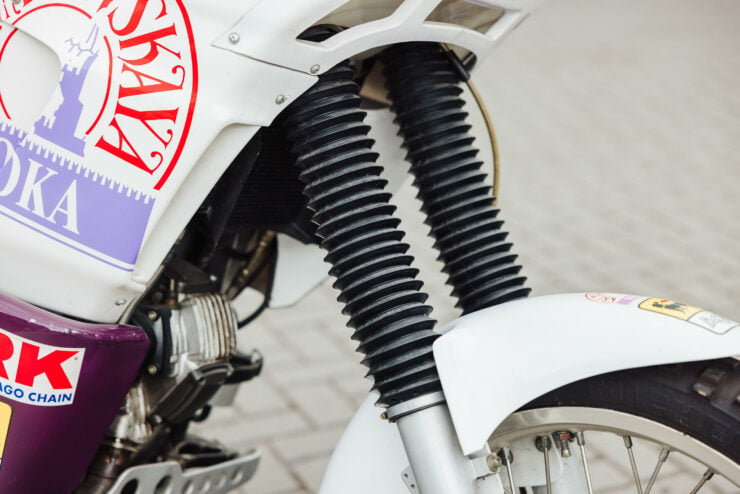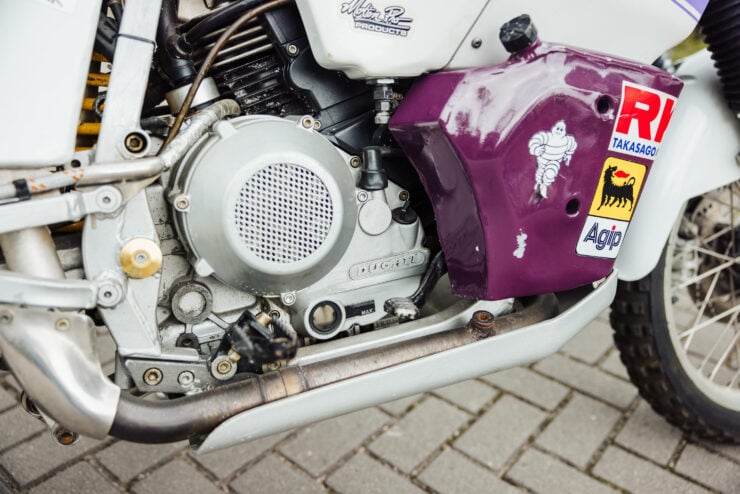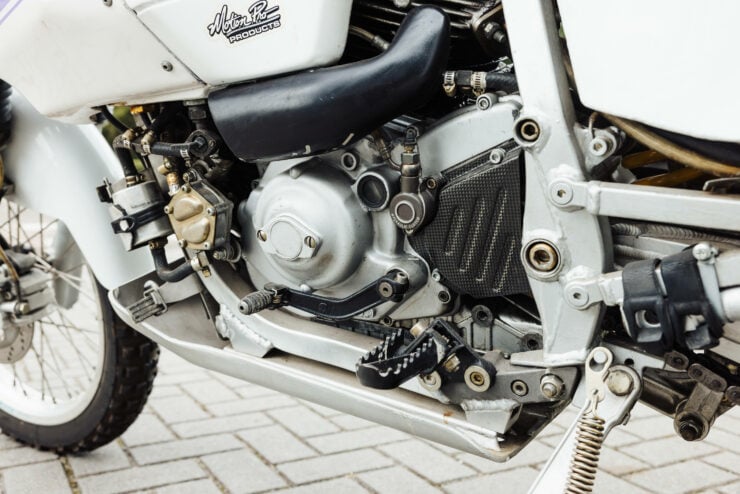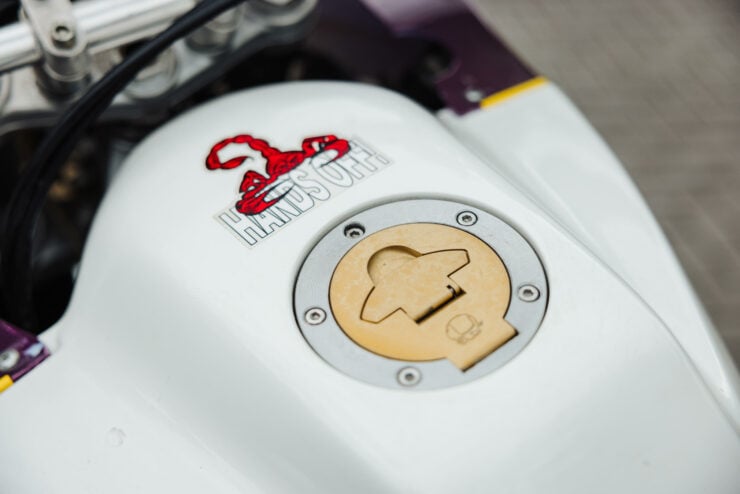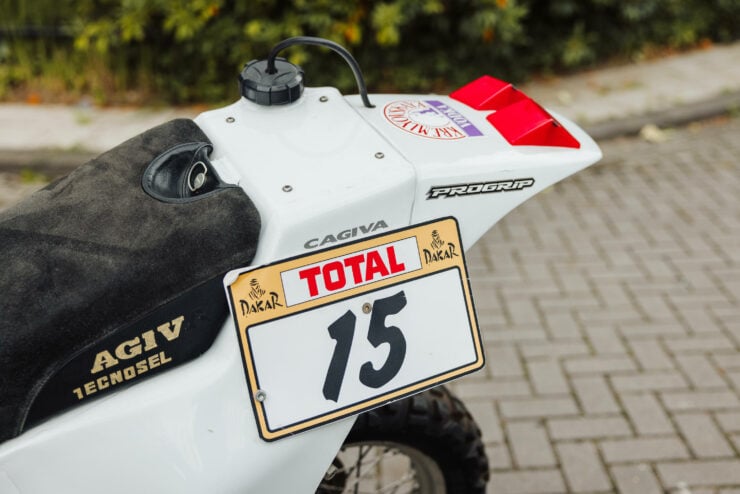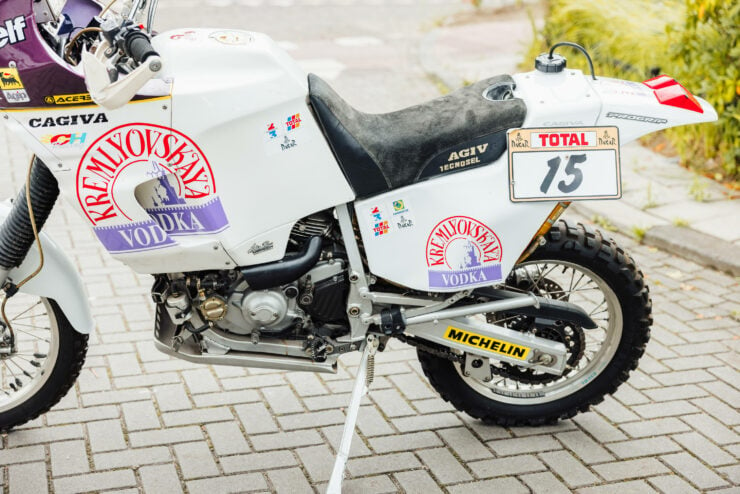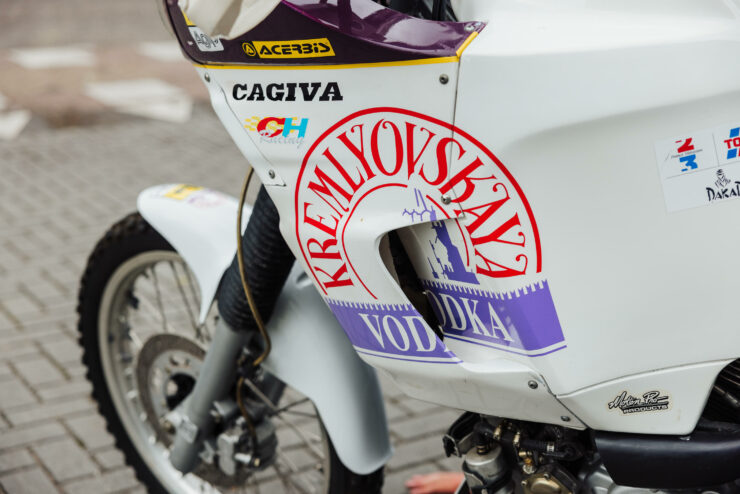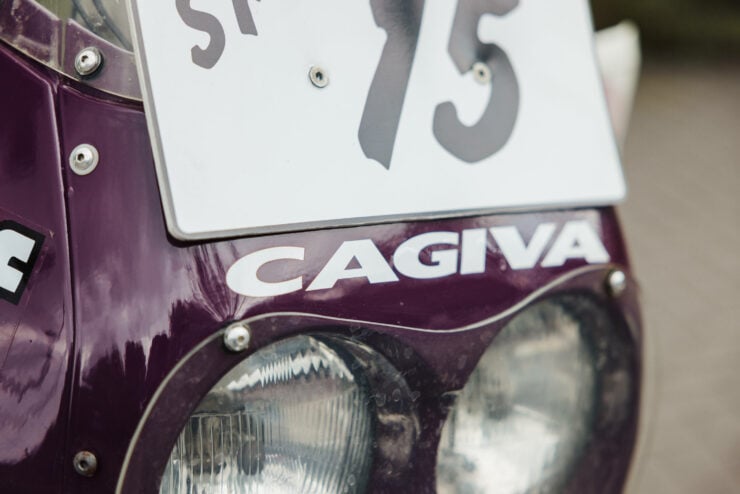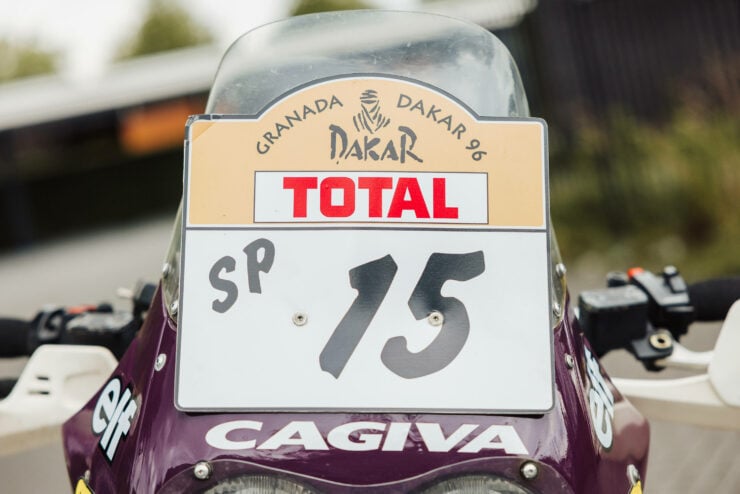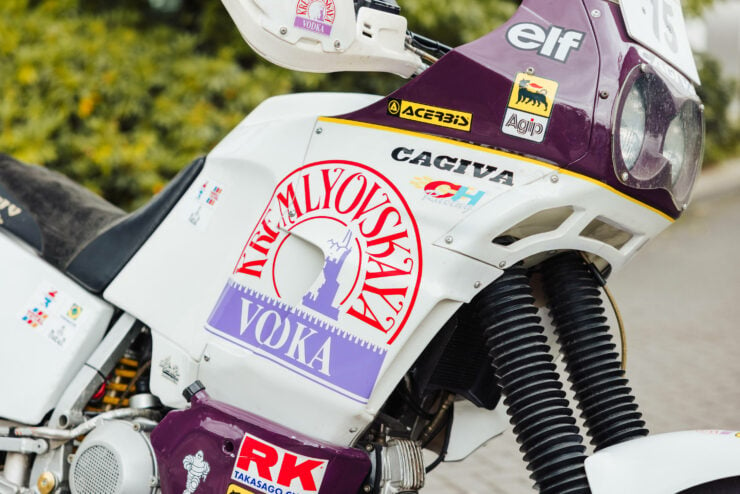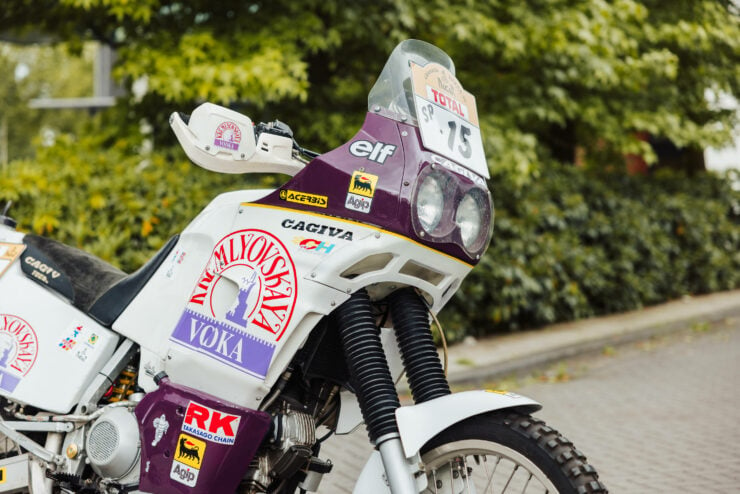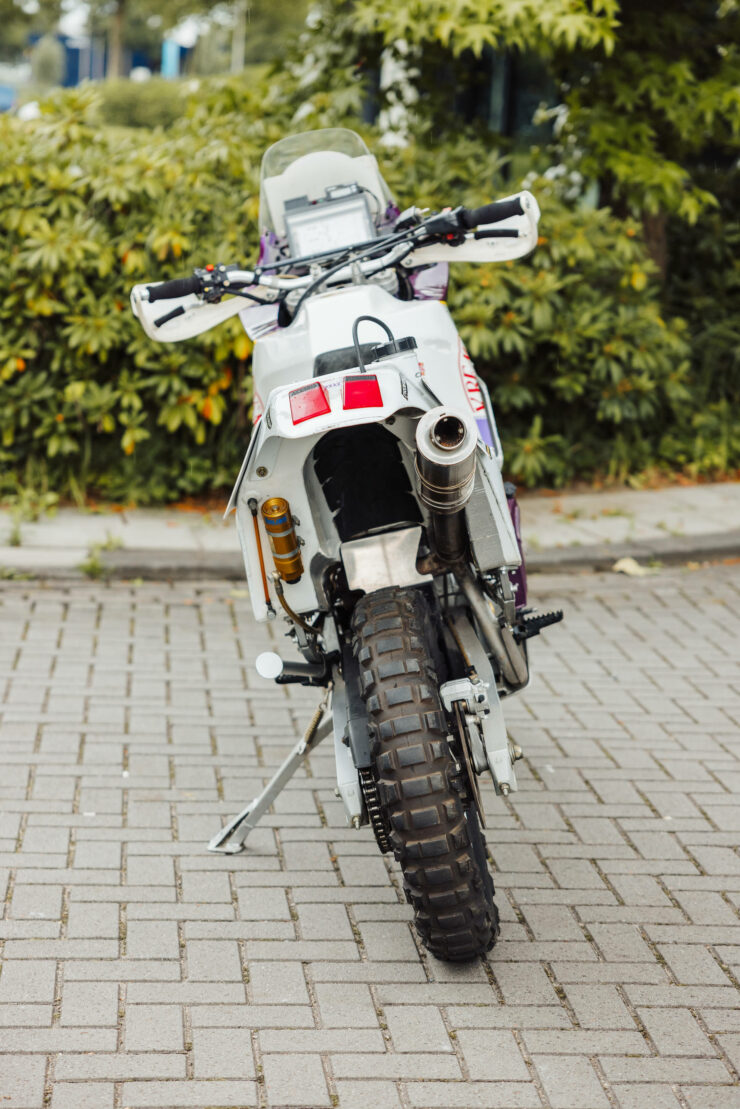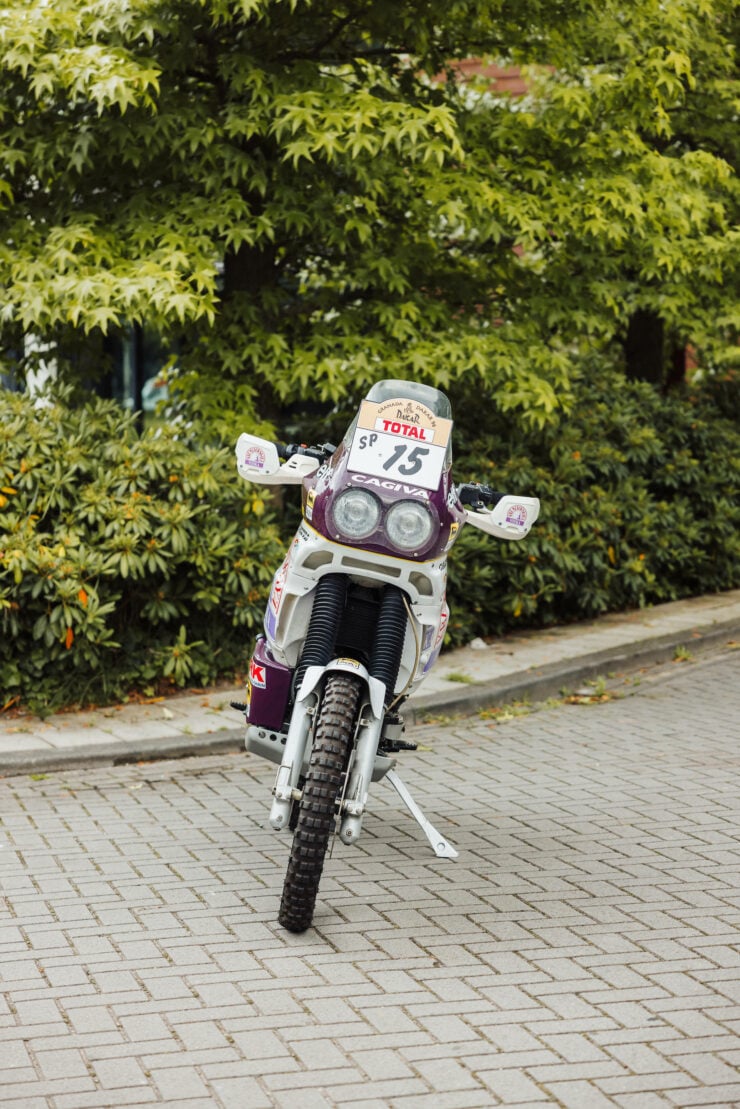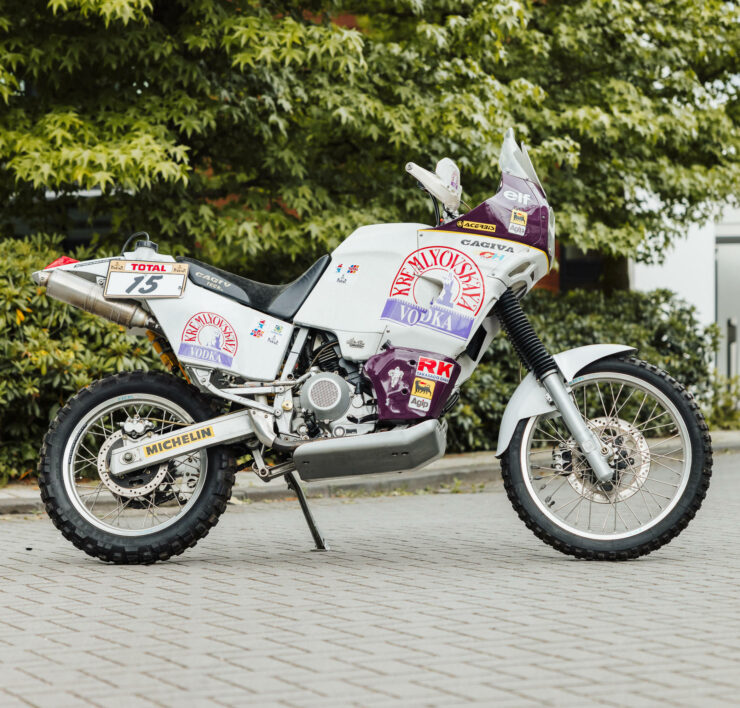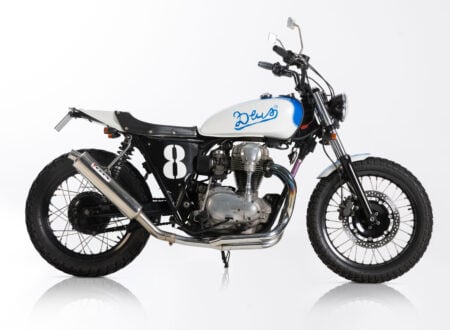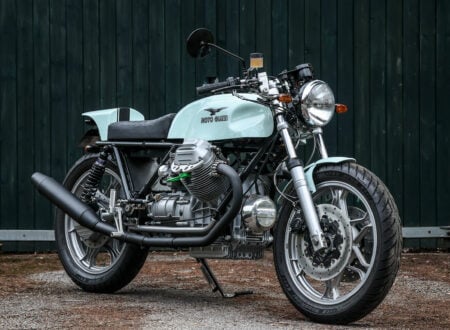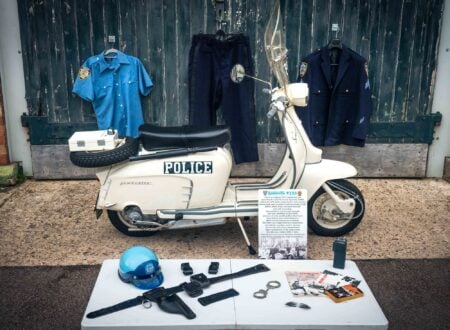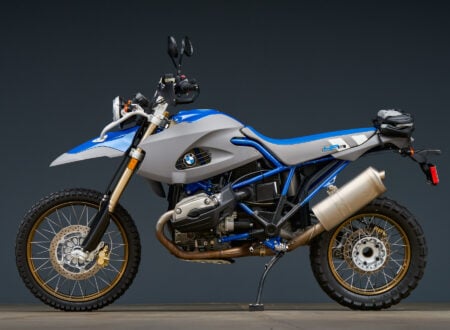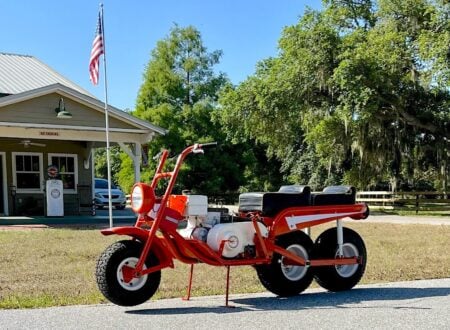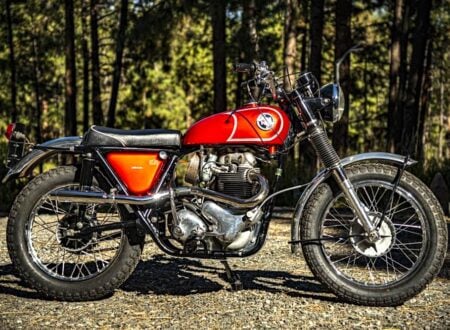This is the Cagiva Elefant that was ridden in the 1996 Paris-Dakar Rally by Cyril Esquirol – the man who holds the record for victories in the Gilles Lalay Classic, which was considered by many to be the world’s toughest endurance race.
The Cagiva Elefant is a motorcycle that didn’t make much sense on paper, but it proved wildly successful in rally raid competition and won the Paris-Dakar Rally twice, once in 1990 and once again in 1994. This example is one of the genuine race bikes that were made, and it’s now being offered for sale with a price guide starting around $7,500 USD.
Fast Facts – The Cagiva Elefant 900
- The Cagiva company was founded in 1950 by the Castiglioni brothers, but it didn’t enter the motorcycle business until the 1970s. Cagiva was initially more focused on producing small-capacity motorcycles, but by the late 1970s, it began acquiring various companies, including Ducati, and became one of the largest motorcycle manufacturers in Europe.
- By the late 1980s Cagiva had bought Ducati, Moto Morini, and Husqvarna. They added MV Agusta to their stable in 1991. The company would enjoy considerable success in Grand Prix motorcycle racing, but they remain most famous today for their dual wins in the Paris-Dakar Rally in 1990 and 1994.
- The Cagiva Elefant was first conceived of as a rally raid race bike in the late 1980s, it was tested and developed and deemed ready to compete in the 1990 Paris-Dakar Rally where it shocked much of the world by winning.
- The Elefant was powered by a V-twin sourced from the Ducati 900SS, it had a bespoke frame, Marzocchi off-road forks, an Öhlins monoshock, and Nissin disc brakes. The curb weight was just 180 kgs and the top speed was listed as 180 km/h.
Cagiva: A History Speedrun
Cagiva’s was founded in 1950, not as a motorcycle marque, but as a metal components manufacturer. Founded by the Castiglioni brothers in Varese, Italy, the company’s name, Cagiva, is derived from the family name and the location of its birth: Castiglioni Giovanni Varese.
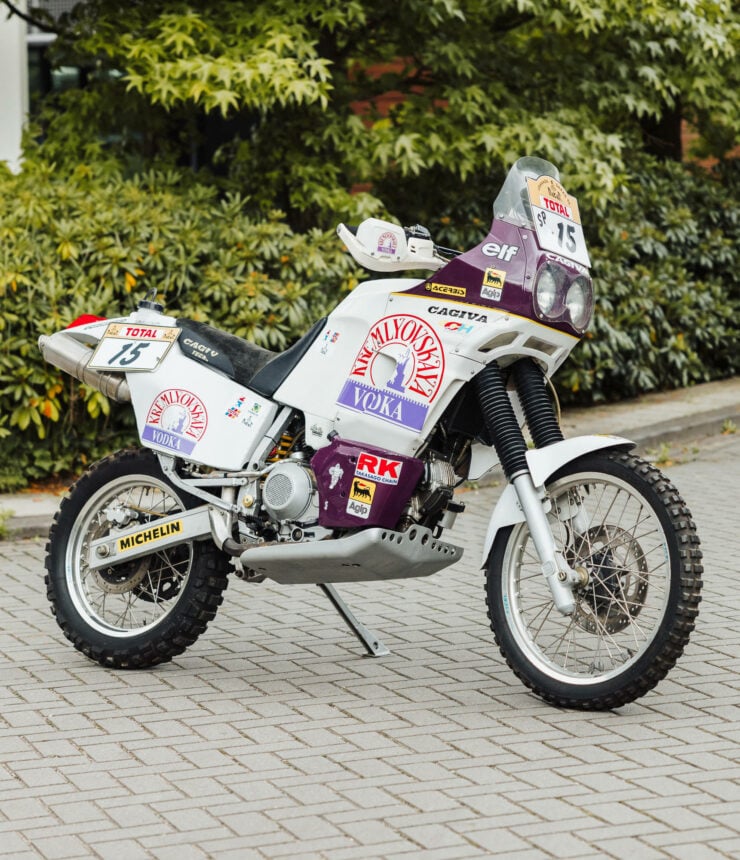 This is the bike that Cyril Esquirol rode in the 1996 Paris-Dakar Rally, it now needs some recommissioning before its ridden again.
This is the bike that Cyril Esquirol rode in the 1996 Paris-Dakar Rally, it now needs some recommissioning before its ridden again.In the 1970s, Cagiva ventured into the motorcycle business by purchasing the assets of a small motorcycle company, Aermacchi. Aermacchi had been previously owned by Harley-Davidson. With this acquisition, Cagiva began producing bikes under the Aermacchi name, but by 1978, they dropped the Aermacchi name and started producing motorcycles under the Cagiva brand.
Throughout the 1980s, Cagiva began expanding its footprint both in terms of production and reputation. They recognized the growing market for small-capacity bikes, producing models ranging from 50cc to 125cc. By the mid-80s, the company was producing around 40,000 bikes annually, making them Italy’s largest motorcycle manufacturer.
The 1980s also saw Cagiva making some significant strategic acquisitions. In 1985, they acquired Ducati, which was in financial trouble at the time. This move not only added a legendary brand to Cagiva’s portfolio but also paved the way for technology and resource-sharing between the two companies.
Following that, in 1987, Cagiva acquired Moto Morini and Husqvarna Motorcycles, then in the early 90s MV Agusta was added to their portfolio, further bolstering Cagiva’s position in the industry.
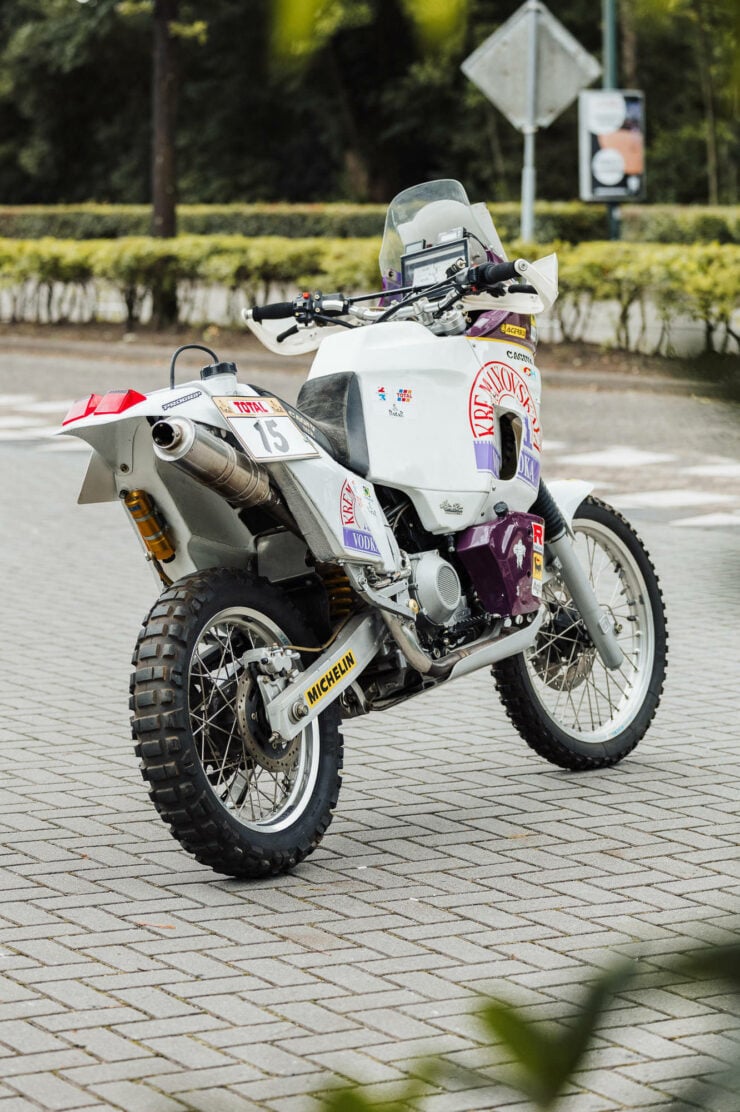 The bike has both front and rear fuel tanks that are switchable, offering hundreds of miles more range than it would otherwise have.
The bike has both front and rear fuel tanks that are switchable, offering hundreds of miles more range than it would otherwise have.Cagiva’s endeavors were not limited to road-going motorcycles. They invested heavily in racing, specifically in the Grand Prix motorcycle racing scene. Although not overwhelmingly successful, their participation boosted brand visibility. The company’s off-road motorcycle, the Elefant, even scored outright victories in the Paris-Dakar Rally in 1990 and 1994.
The 1990s presented financial challenges, economic downturns and shifts in motorcycle demand affected Cagiva. In 1996, they sold Ducati to the Texas Pacific Group. Later, in 2007, the Husqvarna brand was sold to BMW. These decisions were strategic attempts to keep the company afloat.
One of Cagiva’s most important acquisitions was that of MV Agusta – a brand with a storied racing history and pedigree, it became the flagship of the Cagiva Group. In the late 2010s, under the MV Agusta banner, there were hints about reviving the Cagiva name, focusing on electric motorcycles. Though at the time of writing no production motorcycles have been released.
The 1996 Cagiva Elefant Dakar Veteran Shown Here
The 1996 Cagiva Elefant you see here is an original Paris-Dakar Rally racer, as noted in the introduction it was ridden by the great Cyril Esquirol who unfortunately had to retire from the race after sustaining an injury.
Above Video: This is the official recap of the 1996 Paris-Dakar Rally, it covers the major classes and includes over half an hour of narrated footage. If you skip ahead to 24:18 you’ll see the bike from this article racing, with a brief mention of what happened to the rider.
Esquirol was one of the greatest riders of his time, and he holds the record for victories in the Gilles Lalay Classic, which was considered by many to be the world’s toughest endurance race.
The bike has a steel backbone chassis, an aluminum square-section swingarm, and a highly-modified Ducati 900SS V-twin mounted in the middle. This engine proved more than tough enough for all raid competition and it’s helped to make the bike a popular choice for people into vintage adventure bikes.
Suspension consists of Marzocchi off-road forks up front with 45mm stanchions and 290mm of travel. This is paired with an Öhlins monoshock rear also offering 290mm of travel. The bikes rides on a 21 inch front wheel and an 18 inch rear, with Nissin disc brakes front and rear.
Thanks in part to the extensive use of aluminum and some carbon fiber bodywork, the bike is said to tip the scales at just 180 kilograms or approximately 397 lbs.
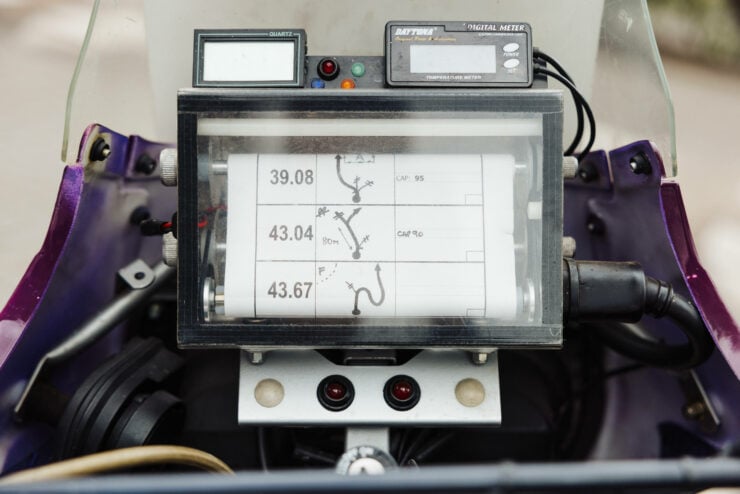 The Paris-Dakar Rally and many other rally raids use road books like the one shown above. Instead of GPS the competitors use system of directions printed on a long roll of paper that they turn by hand using a knob.
The Paris-Dakar Rally and many other rally raids use road books like the one shown above. Instead of GPS the competitors use system of directions printed on a long roll of paper that they turn by hand using a knob.The original Esquirol Elefant you see here is listed as having been on static display for many years, it’s now being offered for sale by Bonhams and they note that it is in need of recommissioning and that as a race bike, it doesn’t come with a registration document.
The price guide for this bike is €7,000- €11,000 which works out to approximately $7,500 – $11,740 USD. If you’d like to read more about it or register to bid you can visit the listing here.
Images courtesy of Bonhams
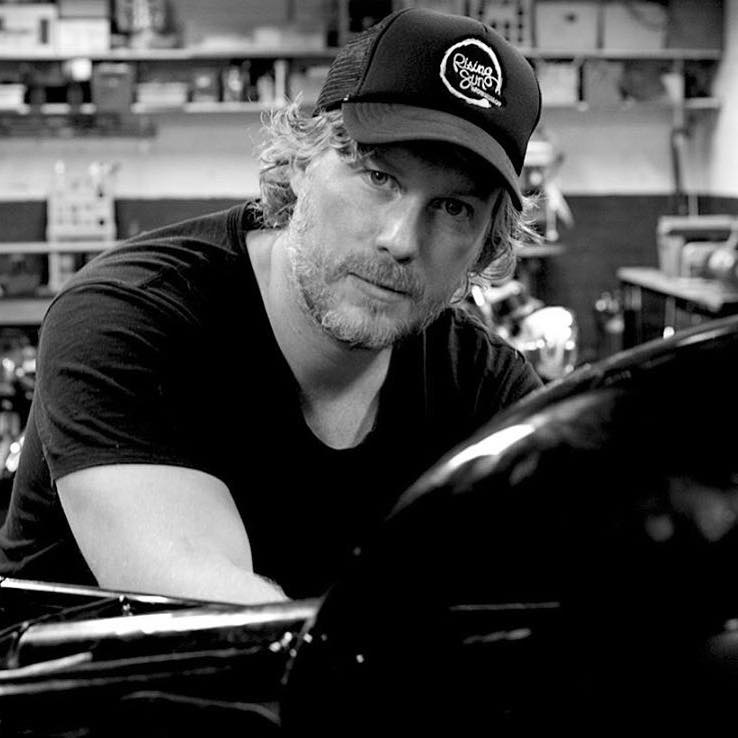
Articles that Ben has written have been covered on CNN, Popular Mechanics, Smithsonian Magazine, Road & Track Magazine, the official Pinterest blog, the official eBay Motors blog, BuzzFeed, Autoweek Magazine, Wired Magazine, Autoblog, Gear Patrol, Jalopnik, The Verge, and many more.
Silodrome was founded by Ben back in 2010, in the years since the site has grown to become a world leader in the alternative and vintage motoring sector, with well over a million monthly readers from around the world and many hundreds of thousands of followers on social media.

